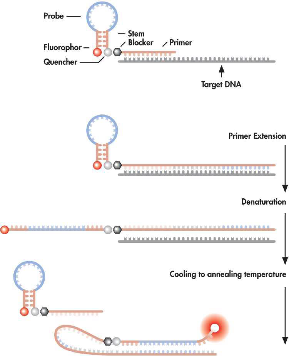Molecular genetics
Understanding the molecular basis of DNA repair is of fundamental interest, but it is equally important to apply this knowledge.
The expertise gained from our studies on DNA base pairing was used in the field of
molecular genetics to develop new methods of mutation analysis. In collaboration
with AstraZeneca we invented a novel fluorescence-based real-time PCR method for
the identification of mutations in the human genome. This was one of the first
successful technologies for rapid mutation detection and was patented, published
(View paper)
and marketed as "Scorpion Primers" DxS, a spin-out from AstraZeneca working in the
field of cancer diagnostics. Scorpions technology has been used in the clinic to
detect mutations in oncogenes associated with drug response, providing an essential
aid to selecting safe and effective anti-cancer therapies.
![]() I am also co-inventor of "HyBeacons", novel fluorogenic probes that utilise DNA
melting temperature as a means of identifying mutations. HyBeacons are the result of
our collaboration with the Laboratory of the Government Chemist (LGC). They were
developed for the rapid diagnosis of bacterial infections and genetically-related
diseases, and also for Forensic applications (View New Scientist article). HyBeacon
methodology has potential for rapid human identification at crime scenes, with clear
implications for crime prevention
(View paper,
View paper).
I am also co-inventor of "HyBeacons", novel fluorogenic probes that utilise DNA
melting temperature as a means of identifying mutations. HyBeacons are the result of
our collaboration with the Laboratory of the Government Chemist (LGC). They were
developed for the rapid diagnosis of bacterial infections and genetically-related
diseases, and also for Forensic applications (View New Scientist article). HyBeacon
methodology has potential for rapid human identification at crime scenes, with clear
implications for crime prevention
(View paper,
View paper).
Our work with Professor Philip Bartlett in Southampton has taken this one step further, producing a new method for identifying mutations in the human genome using a combination of SERS (Surface-Enhanced Raman Spectroscopy) and electrochemical DNA melting (View paper).
